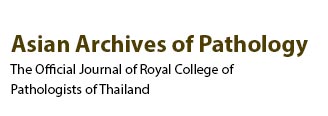[OA-21] HPV-related oropharyngeal squamous cell carcinoma: temporal trend and its association with survival
Phatcharipha Saiya1, Kitti Jantharapattana2, Arunee Dechaphunkol3 and Paramee Thongsuksai1
- Department of Pathology, Facolty of Medicine, Prince of Songkhla University, Songkhla, Thailand
- Department of Otolaryngology Head and Neck surgery, Facolty of Medicine, Prince of Songkhla University, Songkhla, Thailand
- Department of Medicine, Facolty of Medicine, Prince of Songkhla University, Songkhla, Thailand
Human papillomavirus (HPV) – related oropharyngeal squamous cell carcinoma (OPSCC) is rising in Western countries. In Thailand, proportion of HPV-related OPSCC and its temporal trend are limited data on its temporal trend. This study aimed to determine the proportion and temporal trend of HPV-related OPSCC as well as prognostic significance of HPV status in OPSCC in Southern Thai popolation. Patients with OPSCC who had available tissue blocks in Songkhlanagarind Hospital between 2009 and 2020 were included. HPV status of the tumour was screened by p16 immunohistochemistry and then confirmed by real-time PCR. Cox regression analysis was used to evaluate prognostic significance. A total of 494 formalin-fixed, paraffin-embedded tissues of OPSCC patients was evaluated. HPV-related OPSCC was found in 56/494 (11.3%) which showed single HPV infection 73.2% and moltiple HPV infections 26.8%. During 12 years, the proportion of HPV-related OPSCC showed a trend of increasing but no statistically significance. The p16-positive and HPV-positive OPSCC had significant better overall survival than p16-negative and HPV-negative status. In conclusion, southern Thai patients had a low prevalence of HPV-related OPSCC with a trend of increasing. Both p16 and HPV DNA status are strong independent prognostic factors in OPSCC.
Keywords: human papillomavirus; oropharyngeal squamous cell carcinoma; p16


